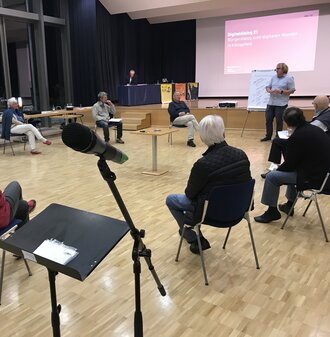
Methods of acquiring socially reliable information implemented at the Public Science Lab at Furtwangen University
Public science is the focus of sociologist Professor Dr Stefan Selke’s work at Furtwangen University. "If research affects people's lives," Selke explains, "then these people should also be involved in the research projects." And that, from the outset. "We don’t research or develop first and then try to assess our technology at the end by asking how our product will be accepted by society. Here, it's about experts working together with the public at an early stage to develop scenarios for future technologies. Such a process is guaranteed to produce different results," says the HFU professor.
Interdisciplinary solutions
Selke sees himself as an interdisciplinary boundary crosser, which is how he came to the topic of his research professorship, the first at HFU, which he has held since 2015. "I'm involved in transformative public science, quite explicitly, not just public sociology," says Selke, who originally studied aerospace engineering. "There is now consensus that the limitless problems of the future, for which we need solutions, certainly cannot be divided into compartmentalised disciplines," he explains. The HFU professor also sees his Public Science Lab as a service provider. "We have a very wide range of methods that we also make available to other researchers and projects," Selke adds.
Innovative citizen participation
As part of his research professorship, Selke has developed innovative methods for participatory research. He also likes to call his approach "consultative research" because the opinions and experiences of ordinary citizens are taken seriously and included. One of his projects, "Digitaldialog21," sees itself as a mood barometer in the topic of digitisation - also in rural areas. In a sub-project, Selke and his team cooperated with municipalities in Baden-Württemberg, involved the general public in citizen dialogues and forums, and even developed a play about a fictitious community in the “Ländle” region together with a dramaturg and actors, showing where the opportunities, challenges and design possibilities of digital change lie from the public’s point of view.
This approach can be applied to numerous topics. "If you involve ordinary people, users, patients and consumers you will obtain socially reliable information," says the HFU professor. "This is also increasingly in demand in research projects and applications," adds Selke, who also works as a reviewer. With this in mind, he is now looking forward to increased collaboration with the Public Science Lab at Furtwangen University.
Telling the science story
Selke is particularly concerned with how science and research are communicated and passed on. "In traditional science communication, research is done to break down the complexity of a topic into layman's terms at the end of the process. Public science, on the other hand, uses a variety of methods and media and involves the public in the research process in a 360-degree perspective." For Selke, a more narrative writing style is also part of this approach. As a book author, he repeatedly addresses the challenge of "telling the story” of science. A successful example – his latest book, "Wunschland", has just been published by the publisher, Ullstein.
More information about the Public Science Lab and its services can be found here: www.public-science-lab.de